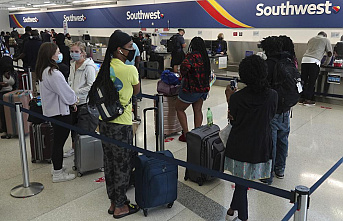At this point last year, the number of cases in California started to rise. By January of this year, California was experiencing the worst pandemic. It was also the epicenter of the virus. Everyday, 700 people died.
The delta variant, which primarily targeted unvaccinated people, drove the latest surge that began in summer. California's daily death rate was at its lowest during this spike.
Johns Hopkins University data showed that the state had 70,132 deaths as of Monday midday. This is the highest number in the country, surpassing Texas by approximately 3,000 and Florida 13,000 respectively. However, California's per-capita fatality rate of just 177 per 100,000 residents ranks in the third lowest for the U.S.
He said, "Take a moment to reflect on what that's meant in California for Californians." "Families who have lost more than one member of their family, key breadwinners, or people who couldn’t protect themselves."
As it enters the colder months of the year, the most populous state is in a better position. It is a leader in vaccines, while those who have survived the virus have a natural immunity that helps to prevent serious illness and death.
Ghaly stated to The Associated Press that even if there is a new surge in the number of life-altering behavior, "the level may be different this winter than last winter."
He doesn't expect California to be as rigid this year, with its business closures and social distancing requirements.
He said, "That's not what we are talking about." "I believe vaccines and masks in certain indoor settings will be a significant support for us getting through any COVID challenges in the future."
One year ago, there were many debates about whether Halloween should be celebrated. Dr. Monica Gandhi, an infectious diseases expert at the University of California San Francisco, said that this was due to all of these arguments. "I believe this winter will be a lot more pleasant than last winter, especially in California."
She noted that more than 70% of Californians have been fully vaccinated, while another 8% are only partially. This compares to around one-third of Californians who had antibodies to the coronavirus in February before vaccines were introduced and when California was struggling to recover from an epidemic.
Marm Kilpatrick is an infectious disease expert at University of California Santa Cruz. She believes that the current level of immunity to prevent another surge of infections is too low, especially because people have become tired of safety precautions.
Kilpatrick stated that the most severe consequences will be felt by those who have never been infected and aren't vaccinated.
California, which was the first state to implement a statewide stay at home order in March 2020, was led by Governor. Many credit Gavin Newsom with saving the state from the type of surge that decimated New York City in the early stages of the pandemic.
Later, Newsom was criticised for being too slow to lift restrictions on businesses and other activities. Newsom was ultimately forced to resign and the voters chose to retain him in office.
Newsom announced recently that the first national plan to mandate all schoolchildren to get vaccinated, even though cases were falling. School must also have masks.
However, the state's local governments have been imposing or lifting requirements on their behalf, creating a confused patchwork of regulations.
A vaccine requirement has been implemented in Los Angeles County for customers of indoor bars, wineries, and small businesses. The city of Los Angeles has a much more severe vaccine mandate. It will apply to almost all indoor businesses. Los Angeles County is not one of the counties with such mandates.
San Francisco and other nearby counties in Northern California announced plans to ease masking requirements when conditions improve. Newsom described Friday's announcement as "an encouraging sign" but cautioned against moving too fast.
He said, "This time last years we were experiencing not dissimilar optimism. Only to experience that winter surge."
California has the lowest rate per capita of new coronavirus infections in the country. It is the only state that the U.S. Centers for Disease Control and Prevention has rated as having a "substantial rate of transmission", which is a step lower than the "high" rate all other states have.
California had 67 cases per 100,000 residents in the week just before the national average of 195. The state's positive rate was 2.5% in the past seven days, while 6.1% is the national average.
Since mid-July, California's R-effective rate, which measures how quickly an infected person spreads disease, has been steadily declining. It currently stands at 0.78 across the state. Any lower than 1 will result in a decrease in the number of people who are infected.
In January, the state saw nearly 222,000 hospitalizations and almost 5,000 ICU admissions. Now there are approximately 4,100 hospitalizations, and 1,100 intensive-care cases. This is down from the 8,220, 2,100 and 2,100 respectively a month ago.
Gandhi believes that California is at a point where it can lift most precautions. She is willing to live with a virus that won’t go away, but isn’t likely to cause serious injury or death for most people vaccinated. She stated that California restrictions are unlikely to be lifted until children aged 5-11 years are fully vaccinated, and improvements are being made in other parts of the country.
The flu season is coming up, and health care providers will be testing patients for common symptoms of the coronavirus.
Ghaly stated that the state had been planning for a flood of testing. Dr. Lee Riley, head of the Division of Infectious Disease and Vaccinology, University of California Berkeley School of Public Health, anticipates problems.
Riley stated that "we're likely to overwhelm the testing services." Riley said that even people who have been vaccinated against the flu can still be affected by severe symptoms and lung damage.
Ghaly warned that the vaccinated could, possibly while wearing masks, "continue to move about the cabin and enjoy some things that we didn't get last year."











